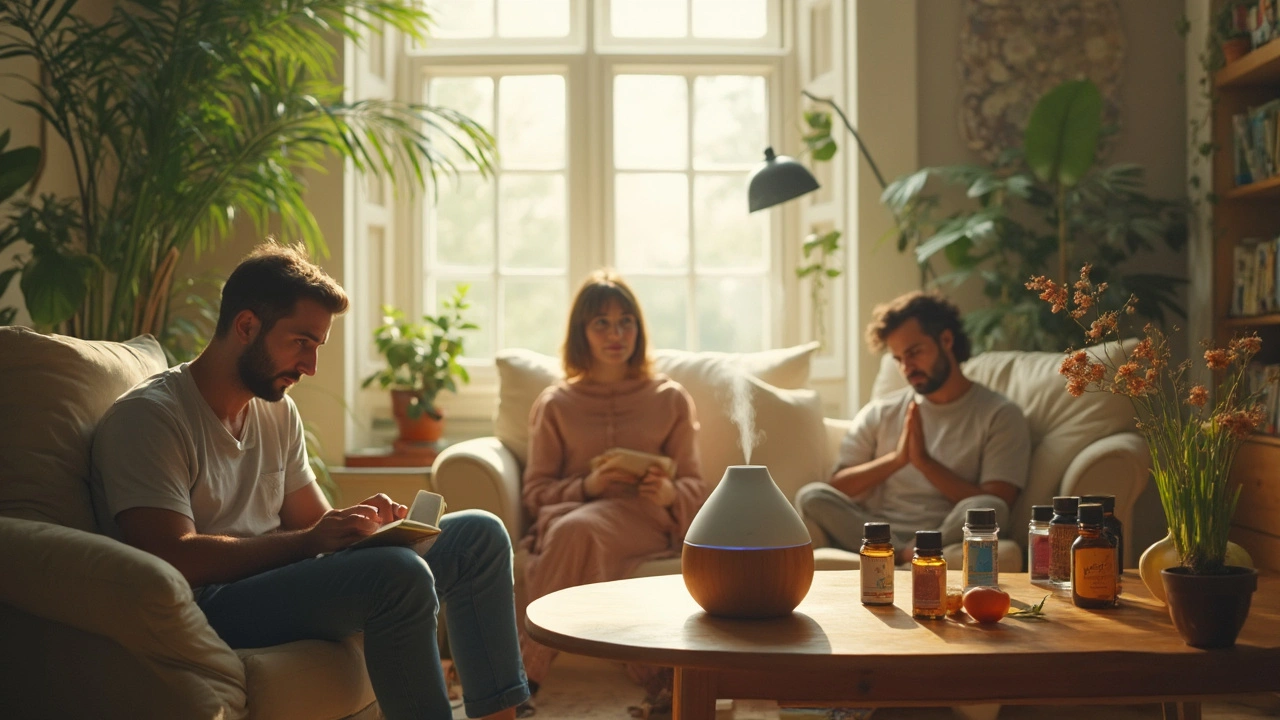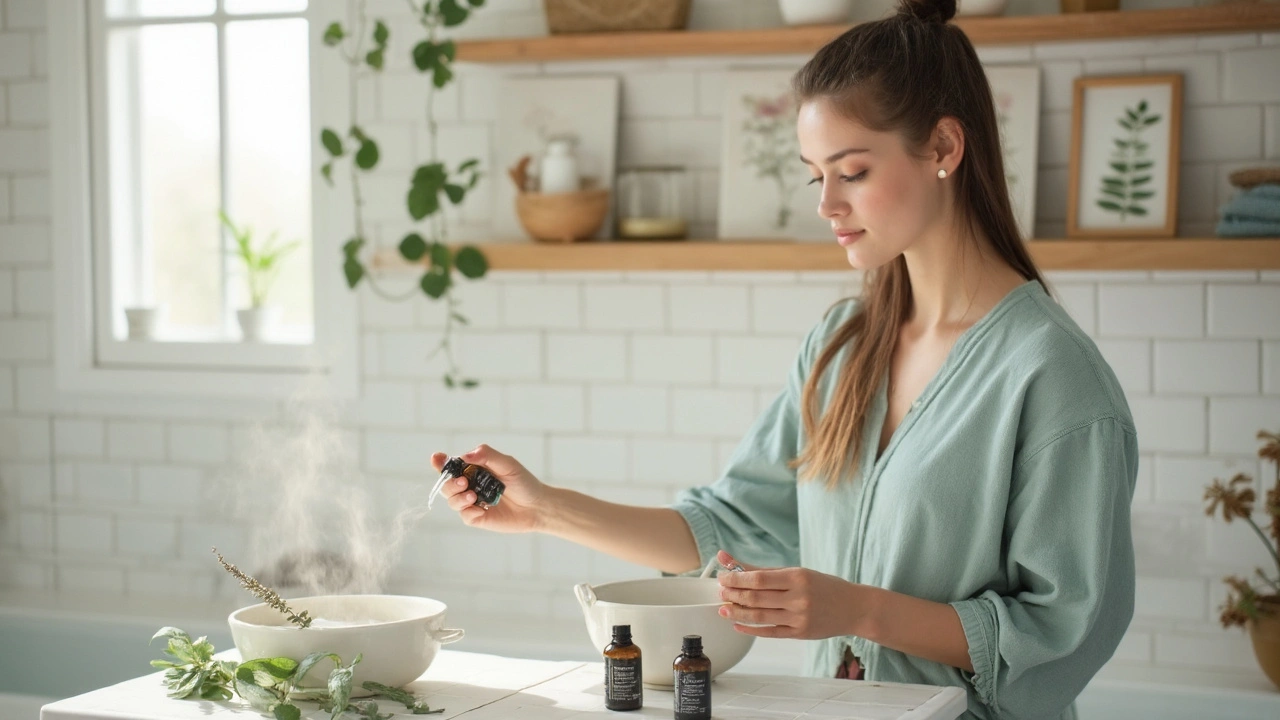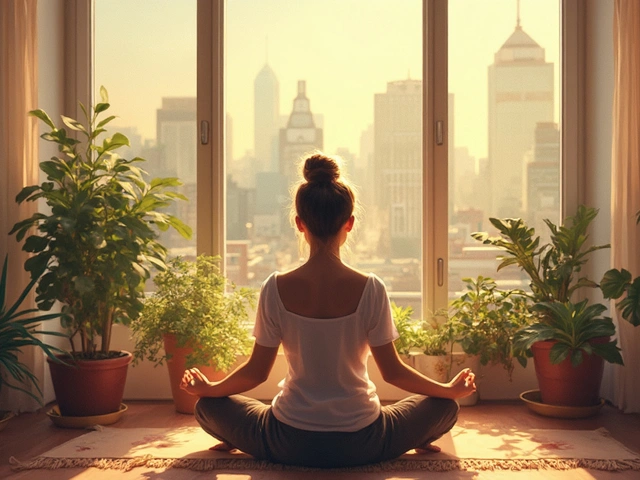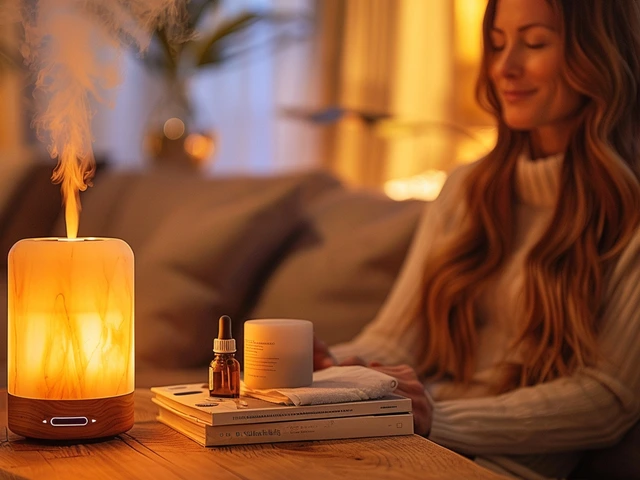
The idea that a scent can shift your mood isn’t just wishful thinking—it’s actually rooted in chemistry and biology. People have been using essential oils for thousands of years, and they’re still a go-to when you want to unwind after a tough day or need a focus boost without loading up on caffeine.
But let’s keep it real: not all oils are created equal, and using them the wrong way can do more harm than good. Ever walked into a space, caught a whiff of lavender, and instantly felt a little less wound-up? That’s aromatherapy doing its thing. The magic isn’t just in your head—certain scents really can help with stress, sleep, and mental clarity. Even hospitals use aromatherapy sometimes to help patients relax before procedures.
Before grabbing a bottle of oil, it pays to know what you’re dealing with. Some oils, like peppermint, wake up your senses and might help with headaches. Others, like chamomile or ylang ylang, set the mood for rest. That’s why picking the right oil for your goal—clear thinking, better sleep, fewer headaches—can make all the difference in your results. And a little goes a long way; you don’t need fancy diffusers or expensive gadgets to start getting the benefits.
- The Science Behind Aromatherapy
- Top Essential Oils and Their Benefits
- Simple Ways to Use Aromatherapy at Home
- Aromatherapy for Stress and Sleep
- Safety Tips and Common Myths
- Everyday Habits for Aromatherapy Success
The Science Behind Aromatherapy
Ever wonder why a whiff of aromatherapy oils can change how you feel almost instantly? It comes down to how your brain and body react to scent. When you breathe in certain essential oils, the tiny molecules shoot straight up to your nose and hit a spot called the olfactory bulb. That's the shortcut to your brain's emotion and memory center (the limbic system). This is why catching a familiar smell can take you back in time, or calm you down after a rough week.
Here’s what’s really going on: different essential oils have unique structures. The molecules in lavender, for example, seem to chill out your nervous system, while peppermint can kick it into high gear. Some researchers have measured actual changes in heart rate, cortisol (your main stress hormone), and even brain wave activity after people used these oils in studies. The effects might not be magic, but they’re not just placebo either.
| Oil | Main Benefit | Common Study Finding |
|---|---|---|
| Lavender | Relaxation, better sleep | Cuts down anxiety, helps people fall asleep |
| Peppermint | Energy, headache relief | Improves alertness, relieves tension headaches |
| Lemon | Refreshing, mood-lifting | Improves mood, reduces nausea |
So, when you use aromatherapy, you’re actually tapping into how the body’s chemistry works—faster than you could with a supplement or food. The brain responds almost immediately, which is why a few drops in a diffuser can shift the vibe in a whole room within minutes.
Just keep in mind: everyone’s response can be a bit different. That's because your scent memories and stress triggers are personal. If something doesn’t wow you, try another oil. The point is to use aromatherapy as a legit tool for boosting your everyday health and wellness.
Top Essential Oils and Their Benefits
Choosing the right essential oils can make a huge difference in how well aromatherapy actually works for you. If you’re not sure where to begin, don’t worry—there are a handful of oils that keep coming up because they just get the job done. Here’s a rundown of some of the most popular ones, what they do, and why they matter in your health and wellness routine.
- Lavender: This is the old reliable. People love lavender for its calming powers, especially when you’re dealing with stress or sleepless nights. It’s so trusted that a 2022 review found it really does help with anxiety and improving sleep quality.
- Peppermint: Feeling sluggish or fighting a nagging headache? Peppermint’s the go-to for an energy boost and can even help with tension headaches. The menthol in peppermint is what gives that fresh, alert feeling. It’s also said to help with digestion issues.
- Eucalyptus: Ever feel stuffed up from a cold? Eucalyptus breaks through the congestion and opens up your airways. That’s why it’s in so many chest rubs and inhalers. Just add a few drops to hot water and inhale the steam.
- Tea Tree: This one’s famous for its natural cleaning and germ-fighting powers. If you struggle with breakouts, tea tree oil is a classic spot treatment. It’s also used in lots of natural cleaning products because it’s tough on bacteria and fungus.
- Lemon: Lemon oil brightens things up, both in your mood and around the house. It’s known for lifting spirits and is often used for focus and energy. Plus, it can cut grease and freshen the air in a snap.
- Frankincense: This oil is often mentioned in conversations about calm and focus. Some people use it in meditation or yoga practice, and there’s evidence it can help lower inflammation.
| Essential Oil | Main Use | Primary Benefit |
|---|---|---|
| Lavender | Relaxation, Sleep | Reduces anxiety, improves sleep |
| Peppermint | Headache, Energy | Relieves headache, boosts alertness |
| Eucalyptus | Congestion | Clears airways |
| Tea Tree | Acne, Cleaning | Antibacterial, antifungal |
| Lemon | Mood, Cleaning | Lifts energy, freshens air |
| Frankincense | Focus, Calm | Promotes calmness, reduces inflammation |
When grabbing essential oils, make sure to look for pure, high-quality oils. Cheap blends usually have synthetic fillers that don’t do much for your wellness. If you’re just starting, it’s smart to stick to these basics so you can see what works for you without getting overwhelmed by the hundreds of choices out there.
Simple Ways to Use Aromatherapy at Home
You don’t need to turn your house into a spa to get the perks of aromatherapy. There are easy ways to use essential oils that fit right into your normal day—no need to splurge on fancy equipment or carve out a lot of time.
One of the simplest tricks? Just add a few drops of your favorite oil to a bowl of steaming water and breathe in deeply. It’s quick, and it works for stuffy noses or stress. Or, put a drop or two on a cotton ball, tuck it into your pillowcase, and you’ve got instant bedtime vibes—lavender and chamomile are popular for this and might help with falling asleep faster.
Sprays are another zero-effort hack. Mix water and a few drops of essential oils in a spray bottle, and use it to freshen up pillows, yoga mats, or your bathroom. Choose lemon or eucalyptus for a wake-up effect, or go with sandalwood for a calm mood. If you like, you can even add a bit of witch hazel or vodka to help the scent cling a little longer.
Diffusers are everywhere these days and are super user-friendly. Ultrasound models just need water and a couple of drops of your chosen essential oil. They're especially good for open spaces. But if you don’t have a diffuser, simmer herbs (like rosemary or thyme) with citrus peels on the stove—the effect is cozy, not overpowering, and it cuts weird kitchen smells.
Here are some go-to methods real people use at home:
- Baths: Add a few drops (three is usually enough) to Epsom salts before dumping into your bathwater. This spreads the oil out and cuts down any skin irritation.
- Massage: Blend a few drops with a carrier oil like coconut or almond—never use essential oils straight since that can irritate your skin.
- DIY sachets: Fill a small cloth bag with rice and add a couple of drops of your favorite oil. These are awesome for dresser drawers, gym bags, or stashing in the car.
Check out this quick comparison for how long certain methods keep the scent going:
| Method | Lasts (approx.) |
|---|---|
| Diffuser | Up to 6 hours |
| Pillow Spray | 2-3 hours |
| Steaming Bowl | 30-60 min |
| DIY Sachet | 1-2 weeks |
Just remember: some oils can bother pets or young kids, especially stuff like tea tree, peppermint, or eucalyptus. So check the label, and start small—you can always add more later, but you can't take back too much scent.

Aromatherapy for Stress and Sleep
Stress is no joke—it can mess with your head, your immune system, and your sleep. Thankfully, aromatherapy offers some simple tools you can use right away, often with just a bottle of essential oil and a few spare minutes.
If you’re looking for a natural way to calm your nerves, a few scents stand out. Lavender is the classic—dozens of real studies show it can help people relax faster and sleep better. In a 2020 study, people who sniffed lavender oil before bed fell asleep quicker and stayed asleep longer. If lavender isn’t your style, try chamomile or bergamot; both are top picks for taking the edge off after a rough day.
- Lavender: Best known for helping with anxiety and sleeplessness. Pop a drop or two on your pillow or in a diffuser.
- Chamomile: Gentle and calming—think of it as the herbal tea of the essential oil world.
- Bergamot: A citrus scent that’s surprisingly relaxing. Try it when you feel tense or overwhelmed.
For sleep, consistency is key. Make aromatherapy part of your nighttime ritual—turn on a diffuser about 30 minutes before bed, or rub a diluted drop of lavender oil into your wrists or the soles of your feet. Don’t use undiluted oils directly on your skin—they can cause irritation, and just a little oil goes a long way.
Dealing with daytime stress? Add a couple of drops to a cotton ball, tuck it in your pocket, and take a sniff whenever things get too intense. You can also mix a few drops with a neutral lotion and apply it to your neck or shoulders. Even taking a minute to breathe deeply with your favorite oil can switch your mindset.
Check out this quick comparison of top aromatherapy oils for stress and sleep:
| Essential Oil | Main Benefit | Good For |
|---|---|---|
| Lavender | Calming, improves sleep | Insomnia, anxiety |
| Chamomile | Relaxes the mind | Stress before bed |
| Bergamot | Soothes nerves | Daytime stress, mood swings |
Using essential oils isn’t a magic fix, but it’s a habit that can make a noticeable difference when it comes to stress and sleep. Start small, pay attention to what feels good, and you’ll find what works best for your routine.
Safety Tips and Common Myths
Let’s get right to it—essential oils can pack a punch, and using them safely is key. Just because something is natural doesn’t mean it’s automatically safe for everyone. In fact, some oils can irritate your skin or make allergies flare up if you don’t know what you’re doing.
The biggest rookie mistake? Putting oils straight on your skin. Always dilute essential oils with a carrier oil like coconut or sweet almond before you even think about touching them to your skin. Going straight from bottle to skin often causes itching, redness, or worse—especially with oils like cinnamon or oregano.
Another myth that gets people into trouble: thinking you can just eat or drink essential oils for quick fixes. Nope. Swallowing oils can cause anything from a stomach ache to serious poisoning. You should only use oils that way if you’re working with a certified health professional who really knows their stuff.
- Keep oils out of reach of kids and pets—kids can have bad reactions, and cats especially don’t do well with some oils.
- Watch out for the sun. Citrus oils like lemon or bergamot can make your skin more likely to burn if you go outside after putting them on.
- Pregnant or breastfeeding? Check with your doctor before using any new oil, even something mild like lavender.
Now, about diffusing: it’s true that breathing in some aromatherapy oils helps with mood or stress, but too much or poor ventilation can trigger headaches or breathing trouble. Keeping your diffuser on for 30–60 minutes at a time is plenty.
If you’re ever in doubt, less is more. As the National Association for Holistic Aromatherapy puts it: “Dilution is not just about being safe. It’s about getting the most benefit with the least risk.”
| Common Myth | The Truth |
|---|---|
| Essential oils are safe because they’re natural | Natural doesn’t always mean safe for everyone |
| You can take any oil by mouth | Only take oils internally under expert supervision |
| More oil = more benefits | Using too much can cause bad reactions or headaches |
| Undiluted oils are more effective | Always dilute before using on the skin |
Quick tip: choose pure, high-quality oils from brands you trust. Avoid anything marked “fragrance oil”—it's not the same thing, and you want the real deal for your health and wellness goals.
Everyday Habits for Aromatherapy Success
Keeping aromatherapy in your day-to-day can actually be simple if you know where to start. The key is to choose routines that fit your lifestyle, instead of making things complicated. Consistency is what gives you the best shot at seeing real improvements in health and wellness.
- Start the day with a diffuser. Add a few drops of energizing oils like peppermint or citrus into a diffuser during your morning routine. It’s a quick way to wake up your senses—even five minutes while you’re getting ready can make you feel sharper.
- Keep a roll-on handy. Make or buy a pre-diluted roller with your favorite essential oils. Roll a bit on your wrists or temples during the day when you need a pick-me-up. Lavender or eucalyptus can also work for a quick stress reset.
- Refresh your workspace. Put a cotton ball with a couple drops of oil in a small bowl on your desk. Rosemary supports focus, while lemon keeps things smelling clean. Just swap out the oil each day if you don’t want your nose to get too used to one scent.
- Bedtime routine. Sprinkle a drop of lavender or chamomile on your pillow, or use a diffuser with a sleep blend for 30 minutes before you turn off the lights. Studies show that lavender can boost sleep quality when used regularly.
- Add oils to your self-care routine. Dilute oils like tea tree or frankincense in carrier oil and use them in massages or baths. Just be sure to check which oils are skin-safe and always patch test first.
Sticking with these small steps is what makes aromatherapy part of your actual life, not just a once-in-a-while treat. If you keep things simple and safe, you’ll notice over time how scents can become quick cues for calm or energy.
| Habit | Main Oil | Main Benefit |
|---|---|---|
| Morning Diffuser | Peppermint | Boost alertness |
| Work Desk Scent | Rosemary | Improved focus |
| Evening Pillow | Lavender | Better sleep |
One last pointer—buy high-quality, pure oils from brands you trust. Synthetic fragrances won’t trigger the same wellness benefits that true plant-based essential oils will. A tiny bottle can last months if you're not overdoing it. Consistency and quality are your best friends here.





